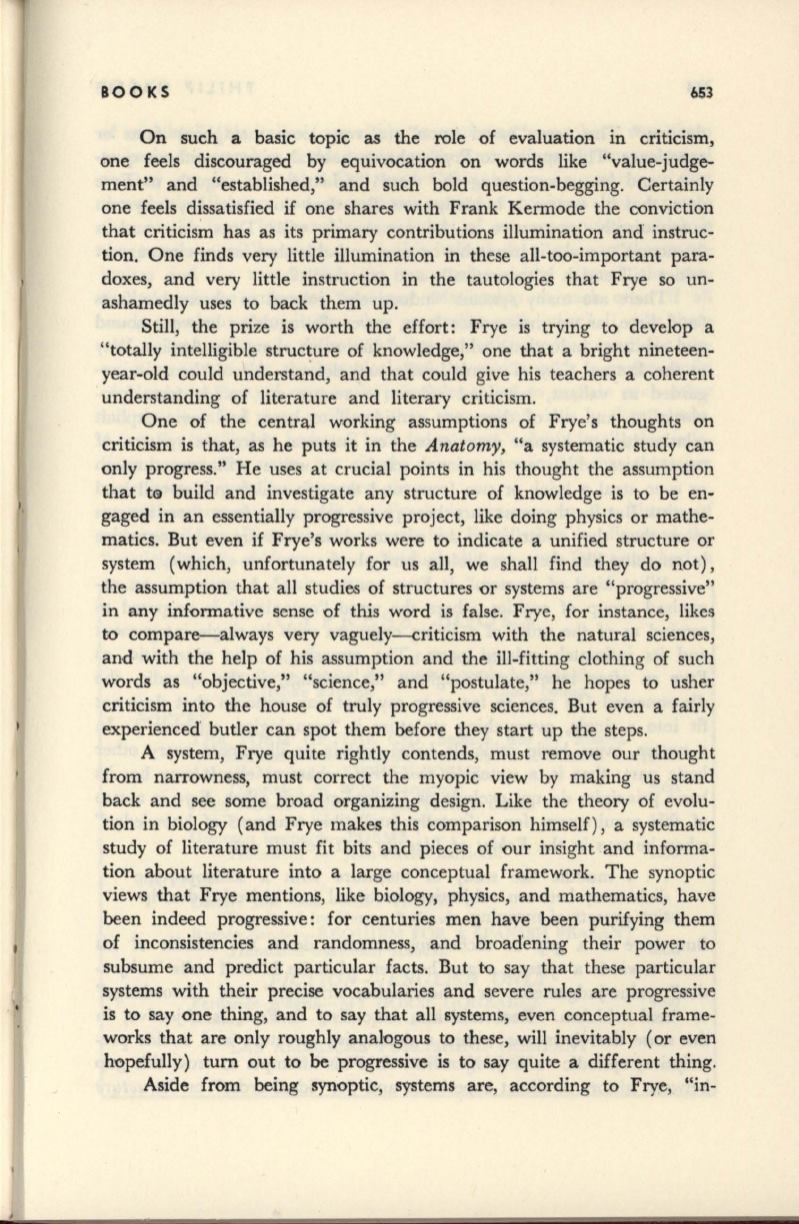

BOOKS
653
On such a basic topic as the role of evaluation in criticism,
one feels discouraged by equivocation on words like "value-judge–
ment" and "established," and such bold question-begging. Certainly
one feels dissatisfied if one shares with Frank Kermode the conviction
that
criticis~
has as its primary contributions illumination and instruc–
tion. One finds very little illumination in these all-too-important para–
doxes, and very little instruction in the tautologies that Frye so un–
ashamedly uses to back them up.
Still, the prize is worth the effort: Frye is trying to develop a
"totally intelligible structure of knowledge," one that a bright nineteen–
year-old could understand, and that could give his teachers a coherent
understanding of literature and literary criticism.
One of the central working assumptions of Frye's thoughts on
criticism is that, as he puts it in the
Anatomy,
"a systematic study can
only progress." He uses at crucial points in his thought the assumption
that t@ build and investigate any structure of knowledge is
to
be en–
gaged in an essentially progressive project, like doing physics or mathe–
matics. But even if Frye's works were to indicate a unified structure or
system (which, unfortunately for us all, we shall find they do not),
the assumption that all studies of structures or systems are "progressive"
in any informative sense of this word is false. Frye, for instance, likes
to compare-always very vaguely--criticism with the natural sciences,
and with the help of his assumption and the ill-fitting clothing of such
words as "objective," "science," and "postulate," he hopes
to
usher
criticism into the house of truly progressive sciences. But even a fairly
experienced butler can spot them before they start up the steps.
A system, Frye quite rightly contends, must remove our thought
from narrowness, must correct the myopic view by making us stand
back and see some broad organizing design. Like the theory of evolu–
tion in biology (and Frye makes this comparison himself), a systematic
study of literature must fit bits and pieces of our insight and informa–
tion about literature into a large conceptual framework. The synoptic
views that Frye mentions, like biology, physics, and mathematics, have
been indeed progressive: for centuries men have been purifying them
of inconsistencies and randomness, and broadening their power
to
subsume and predict particular facts. But to say that these particular
systems with their precise vocabularies and severe rules are progressive
is to say one thing, and to say that all systems, even conceptual frame–
works that are only roughly analogous to these, will inevitably (or even
hopefully) tum out to be progressive is to say quite a different thing.
Aside from being synoptic, systems are, according to Frye, "in-









